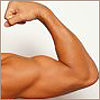With two new books detailing San Francisco Giants player Barry Bonds' alleged steroid use and the continuing controversy about the health consequences of steroid abuse, casual readers have reason to be confused. When is a steroid not a muscle-building steroid?
Anthony Luke, MD, MPH, an assistant professor in orthopaedic surgery and a primary care sports medicine specialist, offers this timely perspective.
Q. What are steroids anyway?
A. Steroids are hormones that occur naturally in the human body. There are two common groups of steroids: anabolic steroids and corticosteroids. Corticosteroids have legitimate medical uses and are prescribed to treat inflammatory conditions such as arthritis, asthma and skin conditions. Anabolic steroids are analogues of testosterone, the main male sex hormone responsible for many functions, including tissue growth. These steroids can be manmade and chemically manufactured to mimic the effect of testosterone in the body.
Q. What do anabolic steroids do?
 |
| Anthony Luke |
A. Athletes and other individuals sometimes take anabolic steroids for their muscle-building potential - to bulk up, enhance performance, increase endurance, reduce recovery time from tissue damage and improve physical appearance. Because they are based on the male hormone, users can behave more aggressively. However, some may even suffer from severe mood swings and uncontrolled aggression and violent behavior, or "'roid rage."
Q. How are steroids used?
A. Steroids can be injected, swallowed in a liquid or pill form, or used topically by rubbing a cream into the skin. Athletes often take steroids in cycles to try to avoid developing negative side effects and avoid tolerance to the desired effects of the drug. "Stacking" is also common. This is where more than one steroid is taken at a time, often in combination with other drugs to enhance the drugs' effects, to reduce side effects and to avoid detection during drug testing.
Q. What would you tell a patient who is either using or considering using steroids?
A. First of all, I would tell them using steroids for athletic purposes is illegal in the United States. I would then explain the harmful effects of steroid use on the body. Using steroids even intermittently can cause both acute and irreversible damage to the body. The negative health problems may not appear for years after the drugs are taken, but are nonetheless very serious. Life-threatening side effects include heart conditions such as coronary artery disease and cardiomyopathy, cancers involving the liver, prostate, testes and brain, and blood clots. Cases have been described of users becoming paranoid, delusional and depressed, resulting in violence or suicide.
Q. The National Institute on Drug Abuse estimates that 325,000 teenage boys and 175,000 teenage girls are using steroids. Are steroids especially dangerous for young adults?
A. The use of steroids by teen athletes is concerning. Steroids can cause bones to fuse together early, stunting growth. Excessive acne and stretch marks are visual changes that suggest steroid use. The drugs can also cause breast growth in males, which is especially disturbing for teens. Females may have an irreversible deepening of the voice, baldness and hair growth on other parts of the body such as the face. Men are also at risk for sterility, while women often experience menstrual irregularities. This may prevent young adults from becoming future parents.
Source: Vanessa deGier



